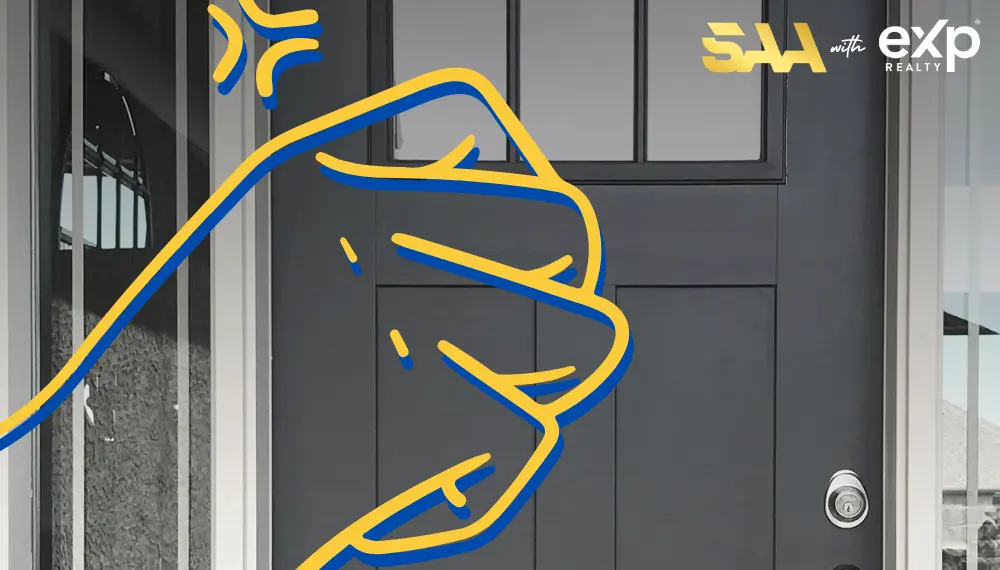Let’s be real—door knocking in real estate can be intimidating. The thought of interrupting someone’s day, facing rejection, or stumbling over your words keeps many agents from trying it. But avoiding it means missing out on one of the most personal, cost-effective ways to generate leads.
Want to stand out from the sea of online agents? A strong door-knocking strategy can help you build trust, start real conversations, and uncover hidden opportunities that digital marketing simply can’t reach. The key? Confidence, preparation, and the right approach. Here’s your handy dandy index:
Table of Contents
Why Door Knocking Works

Advantages of Personal Interaction
There’s simply no substitute for the kind of face-to-face interactions that only real estate can provide to help foster great relationships. Meeting homeowners directly allows for genuine conversations, where both parties can engage meaningfully. This method is particularly powerful when compared to the often impersonal feel of digital communication.
When you’re physically in front of a homeowner, being able to use your body language and tone of voice can really help build that rapport. These non-verbal cues go a long way in communicating your genuine interest and breaking you out of the pack of competitors who default to email or phone.
With limited investment, the unique and personal touch of door knocking gives you a low-cost marketing strategy that truly stands out and works.
Building Trust with Homeowners
Door knocking is a great way for real estate agents to demonstrate their authenticity and trustworthiness. Providing local market knowledge and expertise helps build credibility with homeowners. By sharing personal stories, you add a layer of relatability that builds trust.
Following up on that initial talk shows that you’re trustworthy and serious, making them trust you even more. This approach is particularly important given that 80% of homebuyers want agents who have specific knowledge about the area they want to move to.
Creating Immediate Connections
Starting conversations with open-ended questions builds rapport and allows residents to feel like they are listened to. Using active listening techniques to demonstrate authentic curiosity about their issues helps to establish a comfortable environment.
This kind of environment encourages homeowners to provide their feedback candidly, so you can receive the most insightful critiques. These kinds of insights can be applied to improve your services and target your marketing efforts, strengthening your position as the local expert even more.
Being known as a credible professional who cares for the community will garner you more word of mouth referrals and business opportunities. Door knocking success is not simply closing a deal. It’s about nurturing those budding relationships, even those with the individuals who aren’t prepared to purchase or sell today.
Preparing for Door Knocking

Addressing door knocking in real estate means being strategic. Having a thorough plan is important. You’ll need to identify strategic priority neighborhoods and even individual homes to door-knock. The more familiar you are with your territory the better.
Know your neighborhood demographics to plan your approach. Wealthy family neighborhoods may at least partially be buffered with a parent at home in the afternoon. Don’t just assume that evenings or weekends are going to be the best times. They may very well be. Instead, drive around to find FSBO signs, or look for expired listings ahead of time.
Conduct Thorough Research
Understanding property values and trends is critical. This can help identify potential leads. Collect detailed information on comparable recent sales and nearby amenities.
Best of all, it arms you with helpful talking points once you’re door knocking with homeowners. In addition, look into events in the community. Finding mutual interests can help establish trust.
Gather Necessary Supplies
Put together a folder of all the things you’ll need including flyers, business cards, or door hangers. Personalized, meaningful gifts or notes can go a long way and have a lasting impact.
Have a sure-fire method for logging interactions. It helps with follow-up, too.
Dress Appropriately and Comfortably
Professional, comfortable clothing is a must. Showcase your brand, but be mindful of neighborhood culture. Things like a clean appearance go a long way to inspire confidence.
Set Clear Objectives
Have clear, concrete objectives for each session. Getting new leads or booking more appointments are a few.
Develop specific, measurable outcomes so you can measure success. Change goals based on what you learned.
Effective Door Knocking Strategies

1. Plan Your Approach
Having a door knocking game plan is key. Door knocking can sometimes feel chaotic. Begin by developing a simple, step-by-step plan for each stop. Work out the central talking points that will appeal to homeowners and outline possible pushback.
Be prepared with answers to alleviate these fears. First, plan your visits at times where you know you’ll have the best chance of finding homeowners, such as in the morning. Setting an achievable cap on how many homes you can hit in a day will save you from burning out and help you maintain your enthusiasm.
2. Start with a Friendly Greeting
Sometimes, though, a nice smile and friendly attitude go a long way. Addressing the homeowner by name is important. Using the homeowner’s full name to introduce yourself will further increase the degree of personalization.
If you live in the neighborhood, let them know so you can get them to feel like you’re a friend and neighbor, not a scary stranger. This friendly introduction opens the door to trust and transparency.
3. Understand Client Needs
Asking the right questions is the secret sauce to learning what motivates and worries your homeowners. By carefully listening, you’ll be able to customize your pitch to address their unique needs, making the value of your service more relevant.
Invite them in, do some research, ask questions, show understanding and concern for their situation and ultimately you’ll earn their trust and win more listings.
4. Develop a Persuasive Pitch
Creating a short, clear, and engaging message is key. Identify your unique value proposition and employ narrative storytelling strategies to make your ask personal, timely, and relevant.
Be sure to highlight the features of your services that will best help the homeowner, clearing a path to making your offer stick out, and stand out.
5. Schedule Follow-Up Meetings
Suggest exact dates and times for future meetings to facilitate buy-in. Be courteous and professional, and include contact details so they are easily found.
This method keeps the line of communication open and makes it more likely you will convert.
6. Present Tailored Proposals
Tailor your proposals accordingly to what the homeowner says they are interested in. Provide compelling data and insights to make your case, presenting them with the right solutions to help them meet their own objectives.
A well-tailored proposal demonstrates understanding and increases trust.
7. Address Concerns Confidently
Recognize the objections that will come at you and prepare measured responses. Come prepared with evidence and examples to counter fears and build trust.
If you do encounter hesitations, keeping a cool, courteous attitude will not only diffuse any worries but ensure the chat stays friendly.
8. Close the Deal Successfully
Highlight the main takeaways and remind them of the value your services can provide. In each case, help motivate homeowners to act with clear next steps.
Leave with thanks. Thank them for their time, for their consideration, and to create a friendly climate for continued engagement.
9. Ensure Post-Sale Follow-Up
Follow-up calls or visits keep the relationship strong after the sale. Handwritten thank-you notes or small tokens of appreciation can go a long way and help keep prospective homeowners abreast of market changes and new listings.
This kind of continued communication helps to cement the relationship and is likely to result in repeat business or referrals down the road.
Adapting Techniques for Luxury Markets

Research High-End Neighborhoods
To get a read on the dynamics at play in affluent areas, begin by looking for telltale signs. Seek out gourmet restaurants, exclusive boutiques, and top-tier schools that’ll lure in luxury buyers.
Compare recent sales to identify pricing trends and changes in demand, giving insight into how homes in these neighborhoods are being valued. Knowing the local businesses and services that cater to affluent clients builds your credibility and rapport with affluent buyers.
This preparation enables brokers to provide perspectives that appeal to savvy luxury markets.
Build Strong Relationships
Deepening relationships with homeowners through regular communication is key. Showing up to local events helps build rapport and creates a sense of awareness of you and your business within the community.
Delivering content that luxury homeowners find valuable, such as market trends, establishes you as a trustworthy source. Building trust by showcasing market knowledge can secure multi-million-dollar listings, a strategy proven by successful agents like Ben Bacal.
Make Memorable First Impressions
Having a focused and polished image is key. High-quality marketing materials reflect brand sophistication, while mindful body language and confident tones ensure professionalism.
This new approach works well for luxury clients, helping during face-to-face negotiations, especially in-person deal making, where body language often can affect the deal.
Prepare for Potential Rejections
A good attitude goes a long way towards accepting “no” with professionalism. Rehearsing answers to potential objections helps make these interactions respectful and civically-minded.
Seeing rejections as learning opportunities is a great way to refine techniques and make a stronger first impression next time.
Essential Tools for Door Knocking
Bring Marketing Materials
Door knocking is far more effective when equipped with the proper materials. Have a variety of promotional materials including flyers and business cards on hand. Door hangers are eye catching and help initiate conversations.
Create flashy pieces that display your identity well. Add details of your offerings and knowledge of the local market. Emphasize unique selling points.
Promote interesting aspects of the homes you’re showing, like a standout feature or the benefits of the home’s location. Think about providing virtual training sessions over platforms like Zoom so anyone can join from anywhere.
Use Effective Communication Skills
Good communication is the key to creating new opportunities. Follow up with active listening. Let homeowners tell you what they need.
Keeping good eye contact and an open body language will help you build rapport and connect. Adjust your approach to suit each resident. A strong script will help you open and close conversations with ease.
Invite them to meet one on one to talk about their specific needs and goals.
Offer Value to Residents
Establish yourself as a market expert by providing local context and knowledge. Give homeowners useful resources or information, such as home maintenance tips.
Feature community happenings or undertakings that would appeal to them. Building trust this way is a good way to list high-ticket items.
Door knocking is a low-cost brand strategy that can result in multi-million-dollar contracts.
Overcoming Challenges in Door Knocking

In real estate, door knocking does come with a few challenges. The first hurdle is sometimes the biggest: rejection. Maybe you knock on 100 doors to get 20 good conversations. To avoid these, it’s most important to think strategically.
Tools like PropertyRadar allow Realtors to target the neighborhoods that match their buyers’ needs, making the process more efficient. PropertyRadar’s rich data on properties and owners helps you get more targeted, with the right personalized messaging to break through to qualified clients.
Handle No Responses Gracefully
When no one’s home, dropping off branded materials ensures you remain on voters’ radar. Plus, this method is more respectful of homeowners’ privacy, making sure you aren’t an unwelcome surprise.
Keeping a good attitude helps too, because every door you don’t get an answer at is an opportunity to work on getting a better answer the next time.
Address Objections Effectively
If you can anticipate their objections, you’ll be able to prepare some thoughtful responses. Using data and testimonials to demonstrate that your program works goes a long way toward assuaging concerns.
Even if a door knocking conversation is unexpectedly difficult, staying cool shows that you are professional and worthy of trust.
Avoid Closing on Doorstep
Build rapport, not a sale. First impressions matter. Plan follow-ups to build bridges and strengthen ties.
This leaves the door open for future interactions, providing a non-pressured way to reconnect.
Best Practices for Successful Visits
Developing a schedule that blends door knocking with all your marketing activities is a recipe for success. This involves planning your visits for optimal times, such as weekdays between 8 a.m. 11:30 a.m., when people are more likely to be at home.
There’s no substitute for a strong first impression, and a well-prepared script can ensure you provide vital information in a clear, concise manner. With a good response rate of 20%, timing and approach make all the difference.
Limit Daily Door Knocks
By making a daily target of around 20 homes, advocates can have productive conversations without experiencing volunteer burnout. This simple number allows you to have real conversations, which are always better than an in-and-out visit.
Being mindful of your energy levels will help you stay excited and make every visit worthwhile.
Monitor Your Progress Regularly
Documenting your meetings allows you to measure impact. Monitoring what’s successful and what isn’t allows you to hone your strategy year after year.
Continuous improvement means celebrating small successes, which keeps motivation high and goals always in sight.
Implement Safety Measures
Safety must always come first. Let a trusted friend know where you’ll be, bring a fully charged phone, and use your judgment on what areas of the neighborhood are safe to be in.
Don’t venture into places that make you feel unsafe, for your own safety and peace of mind.
Enhancing Engagement with Residents
Door knocking in real estate is an art that calls for smooth, relatable, and personable engagement. One of the most effective tactics is to pose provocative questions. I like to design open-ended questions, like having homeowners tell me what it’s been like to live in the neighborhood.
This creates a safe space for them to share more personal insights while allowing me to better comprehend their needs. Discussing topics like their home’s unique features, neighborhood changes, or future plans often leads to meaningful conversations. These conversations shape the experience and build trust.
Offering sincere praise is another good strategy. One of my favorite things about a homeowners property is an expansive beautiful garden or a large covered porch. This fosters an inviting, friendly environment.
This level of detail conveys respect and appreciation, establishing a strong bond. Inviting new homeowners to community events is a great way to build connections. Providing a calendar of local events they could participate in is a great way to generate that initial interest and encourage further engagement.
These invitations are a great way to showcase the benefits of community engagement, further building the neighborhood’s sense of community spirit.
Key Takeaways
- Door knocking in real estate is all about face-to-face interactions. It uses the power of face-to-face interactions to foster authentic relationships and trust with homeowners. This technique creates opportunities for instant feedback and more meaningful relationships that digital communication can’t provide.
- Door knocking gives real estate professionals an opportunity to create authentic relationships. It makes their communication more human with body language and allows them to rise above competitors who only use digital ways.
- Real estate agents can maximize their door knocking success by doing some extra leg work to get to know the neighborhoods they’re targeting. This allows them to further develop their strategic plans on a home by home basis.
- When agents come ready with all the right supplies, including marketing materials and gifts, they ensure they make a strong impression on homeowners. This mindset increases their probability of getting favorable replies and future engagement opportunities.
- It takes a strategy to be successful with door-knocking. You have to deeply plan, then implement your strategy with precision, then follow-up, all while adjusting to every neighborhood’s unique prevailing winds.
- To address these door knocking challenges, you need to be resilient and flexible. View objections and rejections as great learning experiences that help you grow and improve.
That’s a Wrap!
Door knocking works—if you do it right. With the right mindset, strategy, and follow-up, you can turn cold introductions into warm leads and lasting relationships. It’s not about selling on the spot—it’s about building trust, offering value, and staying top-of-mind for when homeowners are ready to make a move. Knock with confidence, and the results will follow!
Join Our FREE Team at eXp Realty
Join our team with eXp Realty – the only profitable publicly traded brokerage over the past five years and holds the prestigious title of the best brokerage to work for. The benefits of eXp Realty are unmatched and will truly exceed your expectations!
When you join our team, Smart Agent Alliance, you’ll get more FREE value than you’ll get anywhere else in the real estate business.

Some of What’s included: Access our exclusive SAA Vault Assets to get leads rolling in while you sleep and enhance your business efficiency; attend weekly team video calls filled with invaluable insights and top agent strategies; and receive the Social Agent Academy Program and Investor Army Courses — all of this with more than a $2700 value – absolutely free. And that’s just the beginning! Explore more about our robust team benefits.
Don’t let this opportunity pass you by. Transform your real estate career, maximize your income, and secure your future. Contact us now to schedule a video consultation or email us at team@SmartAgentAlliance.com. We’re here to ensure your success.
Frequently Asked Questions
What makes door knocking effective in real estate?
Door knocking fosters genuine relationships. It enables realtors to interact face-to-face with potential homeowners, helping to build a relationship based on trust and rapport. This personal touch can help agents stand out in a crowded market.
How should I prepare for door knocking?
Know as much as you can about the neighborhood and plan a route. Plan to dress like a professional and come prepared with relevant materials, such as business cards. Walk through your pitch to ensure you always come off confident and concise.
What are some effective door knocking strategies?
So be friendly and take time to listen. Make your pitch specific to what the homeowner is looking for. Make sure to follow up with a handwritten thank-you note or email to cement the relationship.
How can I adapt door knocking techniques for luxury markets?
Provide highly personalized service with an air of exclusivity. Show that you’re specialized in luxury properties and that you understand the special market’s unique needs.
What tools are essential for door knocking?
Use a good CRM to keep track of leads and follow-up. Have either a notepad or a tablet with you to take notes. Business cards, brochures, etc. Are great too.
How can I overcome challenges in door knocking?
Always expect rejection and be courteous regardless of the outcome. Be flexible and willing to change your approach based on what you hear. As with all things, a little persistence and adaptability go a long way.
What are best practices for successful door knocking visits?
Plan your canvassing times for when homeowners will be most likely to be home. Be mindful of their time, and never burn a bridge – always leave them wanting more.







